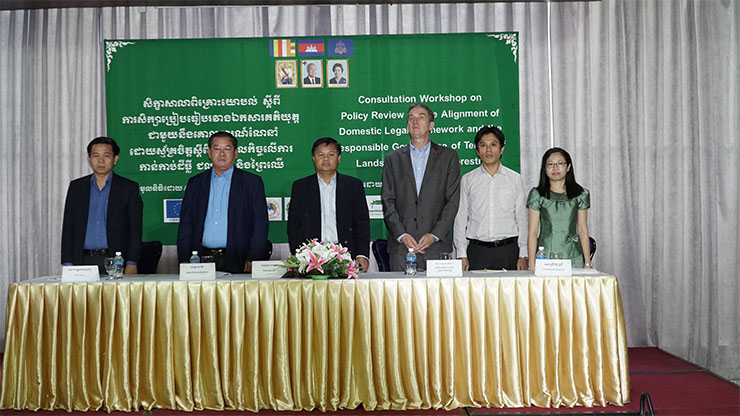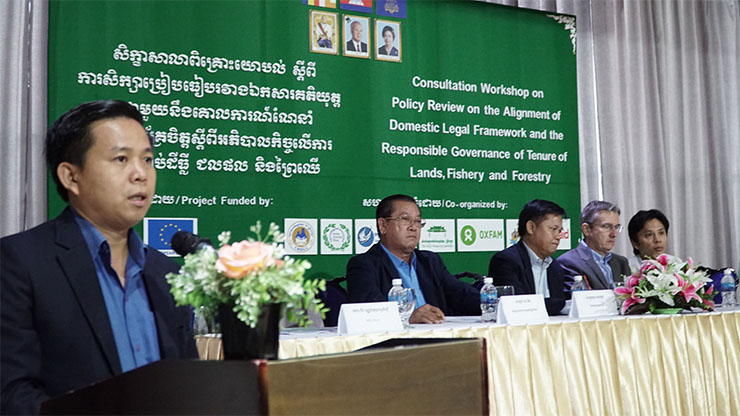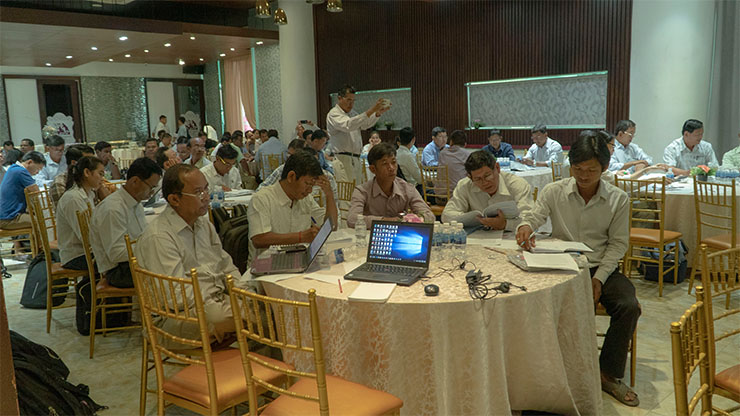
The working group of VGGT land governance, fishery and forestry (VGGT) which consist of NGO Forum, Building Community Voices (BCV), Cambodian Centre for Human Rights (CCHR), STAR Kampuchea, Oxfam Cambodia and ActionAid Cambodia working together to strengthen cooperation between governmental, private sector and CSOs for contributing to establish the land governance, fishery and forestry. The working group initiates the study to compare the existing policy and national law in the context of food security. The result of the study conducted by an independent consultant will be presented in the national consultation workshop to reflect, verify, collect inputs and recommendations for consolidating in the first draft. The objective of the study is to understand about the important and role of the international voluntary guideline land governance, fishery, and forestry (VGGT) and compare with the national guideline of royal government of Cambodia and legal documents in the sector of land, forestry, and fishery. The draft study completely finished as the basis for a further consult with other stakeholders and interviewee who involve in the study as well as a government official, CSO, independence consultant and community from some provinces.

Mr. Tek Vannara, Executive Director of NGO Forum provide opening remarks and share information related to the process of the environmental code which reaches to the amendment of the other three laws related to fishery, forestry and protected area. He added that he was very happy in the cooperation with the government especially relevant ministries in this sector. He also expressed thank to the cooperation and encourage for active participation in this consultation workshop. Mrs. Hum Boramy, Executive Director of ActionAid Cambodia expressed thanks to all participants. She stated that the study happens with the finance support from the EU through “strengthening CSOs and vulnerable community in Cambodia to secure land title” program which is help the vulnerable community to secure land title through good governance, high accountability and comprehensive policy. She added that this study report contributes to better livelihood and food security under the national framework as well as the human rights aspect. Mr. Franck Viault, Head of Cooperation, EU Delegation to Cambodia welcome and happy to involve in the national consultation workshop. He thought VGGT is a voluntary guideline of land governance, fishery and forestry was approved in 2012 and initiated by FAO. He added that the land, fishery and forestry resources are very important in providing food and income, especially for a poor community in the rural area. This workshop, however, conducted in accordance with the rapid urban growth and agricultural land issues in which cause of population and business growth, and concern relation to deforestation.
The contribution of CSOs’se inputs into the research study is very important and highly appreciated. Mr. Franck Viault proved that within the past five years, EU provides lots of funding to government and Non-governmental Organization that are working related to this sector. Due to the result of EU meeting in Brussel to approved funding package, approximately of 100 million dollars for fisheries development in Cambodia. He added that the EU will continue to cooperate with CSOs and government for better implementation of these sectors.

H.E Chong Phet, Deputy Secretary General of Ministry of Rural Development provided welcome remarks that this is impressive workshop and very important for discussion and generate inputs to ensure food security, and in which relation to the three laws on land, fishery and forestry. However, he MRD is involve in developing alternative livelihoods of the poor community in rural area. H.E then muted the audiences how the relationship between forestry law and forest degradation in which all issues should be addressed outside the judicial system which more focus on the sub-national level. In other words, H.E shared some steps for addressing land issues including 1). Systematic registration is better; 2). The commune council addressing land issues by establish the committee to help the community. At the end, H.E supports the working group of VGGT that has been established.
H.E Touch Ponlok representative of Ministry of Interior provided welcome remarks and expressed admire to the VGGT working group. H.E shared information of the national committee for sub-national democratic development implementation including strengthening the management to ensure the ownership of comprehensive management to promote NGOs and community participation and closing the workshop. The results of this workshop will be used to compare and provide inputs for finalizing the study report.